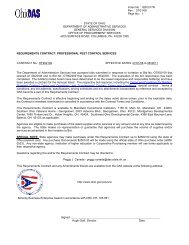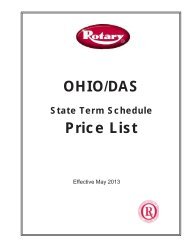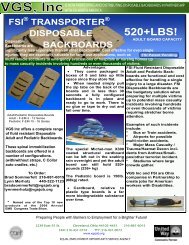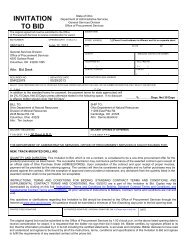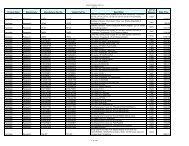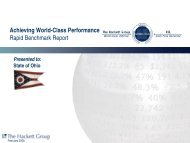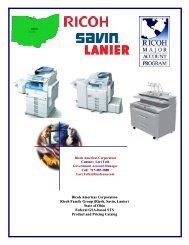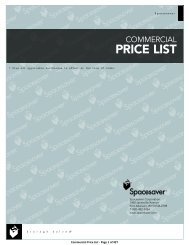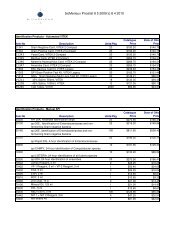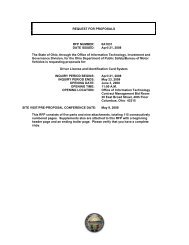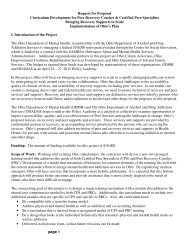Annual Opportunity Sizing - State Procurement - State of Ohio
Annual Opportunity Sizing - State Procurement - State of Ohio
Annual Opportunity Sizing - State Procurement - State of Ohio
Create successful ePaper yourself
Turn your PDF publications into a flip-book with our unique Google optimized e-Paper software.
procurement topic or be procurement-related as specified in<br />
the “Pre-Approved Coursework” listing (See Section II <strong>of</strong> this<br />
Handbook).<br />
In order to receive credit for coursework at the formal<br />
education level, applicants must provide the UPPCC with an<br />
<strong>of</strong>ficial sealed transcript that must be submitted at the time<br />
<strong>of</strong> application. The applicant must have completed the<br />
course and received a passing mark in order to receive credit<br />
for the course.<br />
Applicants may utilize coursework taken in conjunction with<br />
a formal degree as long as the coursework can be<br />
documented with an <strong>of</strong>ficial sealed transcript and meets the<br />
procurement-related coursework requirement. Applicants<br />
should reference in the coursework section <strong>of</strong> the application<br />
form if he/she will be using the same <strong>of</strong>ficial transcript to<br />
document coursework as is being used to document formal<br />
education.<br />
To convert credit hours for college/university level courses<br />
into contact hours, the applicant must multiply total credit<br />
hours for each course by 8. The average college level course<br />
earns 3 credit hours which is equivalent to 24 contact hours<br />
(3 credit hours X 8 = 24 contact hours).<br />
Other Educational Providers:<br />
Copies <strong>of</strong> certificates <strong>of</strong> attendance, participation,<br />
completion, etc. are the best form <strong>of</strong> documentation for<br />
coursework and/or training not taken at the higher<br />
education level. National members <strong>of</strong> NIGP may submit a<br />
copy <strong>of</strong> the member pr<strong>of</strong>ile in place <strong>of</strong> certificates for NIGP<br />
National education attended. Applicants should contact NIGP<br />
National Headquarters directly to obtain instructions on how<br />
to access the member pr<strong>of</strong>ile or to obtain a NIGP transcript<br />
<strong>of</strong> courses completed. All coursework documentation must<br />
include the specific procurement topic addressed, the date<br />
<strong>of</strong> the course or training, the duration <strong>of</strong> the training, the<br />
location <strong>of</strong> the training and the total number <strong>of</strong> hours. The<br />
UPPCC awards one contact hour for each classroom hour <strong>of</strong><br />
education or training. Each full day <strong>of</strong> classroom training is<br />
calculated as eight contact hours.<br />
Major procurement industry events such as<br />
international/national/regional conferences and meetings are<br />
also recognized by the UPPCC and are eligible for<br />
coursework credit. Specifically applicants may receive 24<br />
total contact hours for full attendance to the NIGP National<br />
Forum & Products Exposition and 16 total contact hours for<br />
attending the NASPO <strong>Annual</strong> Conference and other<br />
international/national conferences. Chapter and regional<br />
meetings are also eligible for coursework credit, however,<br />
applicants may not include chapter business meetings, social<br />
luncheons, vendor presentations, and chapter entertainment<br />
events as these types <strong>of</strong> events are not considered to be<br />
educational in content.<br />
Applicants may also earn credit for on-line and web-based<br />
education and training. On-line training and Web-based<br />
trainings also earn one (1) contact hour for each hour,<br />
however, if the on-line training requires self-study and<br />
reading assignments in addition to on-line instruction those<br />
additional hours may not be included in the total contact<br />
hours earned for the on-line training.<br />
Inter-agency training is also applicable for credit as long as<br />
the training is on a purchasing topic and can be properly<br />
UPPCC Official Candidate Handbook for Certification<br />
2008 Edition • Page 10 <strong>of</strong> 26<br />
documented via an agency transcript or completion<br />
certificate.<br />
EMPLOYMENT EXPERIENCE<br />
Position descriptions are used to set the “generic”<br />
description <strong>of</strong> the types <strong>of</strong> duties performed by positions in<br />
specific classes <strong>of</strong> employment. An Official Position<br />
Description includes a class title; a definition <strong>of</strong> the kind <strong>of</strong><br />
work performed in that class; distinguishing characteristics<br />
<strong>of</strong> the class; illustrative duties; knowledge, skills and abilities<br />
required to perform the work; employment standards for<br />
incumbents <strong>of</strong> positions in that class; required licenses and<br />
certificates; and necessary special requirements (if any)<br />
which must be met. The UPPCC requires Official Position<br />
Descriptions as a means <strong>of</strong> documenting experience and<br />
determining whether the applicant performs essential<br />
purchasing and/or management functions; particularly in<br />
those cases where the <strong>of</strong>ficial title <strong>of</strong> the position does not<br />
accurately reflect the work that is performed. As the UPPCC<br />
does not make decisions on applicable experiences based on<br />
position title alone, experience cannot be considered without<br />
the benefit <strong>of</strong> a Position Description.<br />
Often times the Official Position Description is so generic<br />
that it does not provide a true picture <strong>of</strong> the position being<br />
performed. In such cases, the UPPCC will accept a “Working”<br />
Position Description developed by the employee’s immediate<br />
supervisor and validated by an <strong>of</strong>ficial in the Human<br />
Resources department in addition to the Official Description.<br />
Under no circumstances are applicants to develop and<br />
submit their own “Working” Position Descriptions, nor should<br />
a “Working” Position Description be submitted without the<br />
Official Position Description.<br />
Alternate personnel documents issued by the Human<br />
Resources Department <strong>of</strong> the governmental entity or<br />
business may be accepted as a variation <strong>of</strong> the Official<br />
Position Description if an Official Position Description is not<br />
available. At a minimum, this documentation must be on<br />
government or business letterhead and authenticated by the<br />
Human Resources Director to the fullest extent possible.<br />
Under no circumstances are resumes acceptable as an<br />
alternate form for documenting work experience.<br />
Applicants may have difficulty locating suitable<br />
documentation <strong>of</strong> duties performed for an organization that<br />
is no longer in business; however it is not an impossibility to<br />
locate appropriate alternatives for defunct organizations.<br />
As a rule, corporations must keep personnel records for a<br />
number <strong>of</strong> years. The state archivist should be able to<br />
provide applicants with the statute <strong>of</strong> retention and where to<br />
apply for past records.<br />
In addition, the applicant may also have maintained the<br />
required information and documents in his/her private<br />
records. Past <strong>of</strong>ficial position descriptions, performance<br />
evaluations or other documentation that can be used to<br />
document past experience with defunct organizations.<br />
Furthermore, letters from previous co-workers or former<br />
supervisors describing your duties in the position may also<br />
be acceptable.




